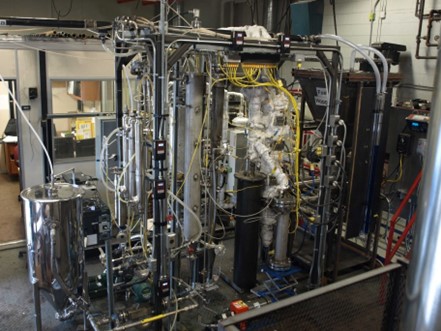Project location: CanmetENERGY Ottawa, Ottawa, ON.
Timeline: 5 years (2023 to 2028)
Program: Bioenergy
Project Overview and Objectives
This project advances biomass conversion into biofuels for industry and transportation by developing, assessing and optimizing cutting-edge pyrolysis and hydrothermal technologies. We aim to create biocrude, biochar (biocarbon), and renewable gaseous energy sources such as biohydrogen from residual lignocellulosic biomass - specifically agricultural residues, forest residues, and municipal solid waste. By transforming these materials into bioenergy solutions, we contribute to emissions reduction and support Canada's goal of achieving net-zero emissions by 2050.
The state-of-the-art facilities at CanmetENERGY-Ottawa allow detailed exploration of biomass conversion conditions that enable the generation of multiple product streams with customized properties for diverse applications. These technologies can operate as stand-alone solutions or integrate into existing industrial setups, offering cost-effective pathways to reduce emissions.
The primary objective is to maximize biomass utilization by converting residual materials into valuable bio-based products, thereby reducing waste and enhancing environmental benefits.
The project is run in close collaboration with industrial partners to scale biofuel production processes for commercial use.
Impact and Innovations
This project delivers low-carbon alternatives for industries that are hard to decarbonize, such as transportation and high-temperature industrial processes. The multiple product streams generated - such as biocarbon, biocrude, and bio-reductants - create new market opportunities and enhances the economic and environmental perspectives of bioenergy initiatives.
Liquid biofuels production and biocarbon for sequestration result in net-negative carbon emissions, providing significant climate and environmental benefits.
Innovative digital modeling and artificial intelligence are used to enhance predictive modeling and map the relationship between feedstock, process parameters, and bioproduct quality. This process allows feedstock flexibility and optimizes conversion efficiency. Our advanced research methods, including life cycle analysis (LCA) and techno-economic assessments (TEA), help identify the most promising biomass conversion technologies.
The pilot-scale testing results help validate various models and support process readiness for industrial application. Collaborations with industry partners in the iron and steel, transportation, and energy sectors ensure that our innovations meet real-world needs and are commercially viable.
Results and Outcomes
This project contributes to the development of low-carbon liquid biofuels for transportation and heavy industry, biocarbon for industrial applications, and biochar for carbon sequestration. The knowledge generated will guide policy decisions, support industry innovation, and contribute to a more sustainable future.

Figure 1: CanmetENERGY Ottawa’s fluidized bed fast pyrolysis pilot plant
Contact CanmetENERGY in Ottawa
To learn more about this project, email our Office for Research Partnerships and External Relations..